An Examination of Nature vs. Nurture in Aggressive Behavior
VerifiedAdded on 2020/12/18
|9
|2474
|378
Essay
AI Summary
This essay delves into the ongoing nature versus nurture debate, focusing on its implications for aggressive behavior. It explores the concepts of 'nature' (genetic and biological influences) and 'nurture' (environmental factors), examining proactive and reactive aggression. The essay analyzes the impact of genetic inheritance, environmental experiences, and the role of twin studies in understanding the development of aggression. It discusses the cognitive and psychoanalytic approaches to aggression, highlighting the contrasting viewpoints on whether aggression is learned or inherited. The essay also considers the influence of media exposure and the interplay between nature and nurture, emphasizing that both are interconnected and influence each other. The conclusion underscores the complexity of the debate and the multifaceted nature of aggression.
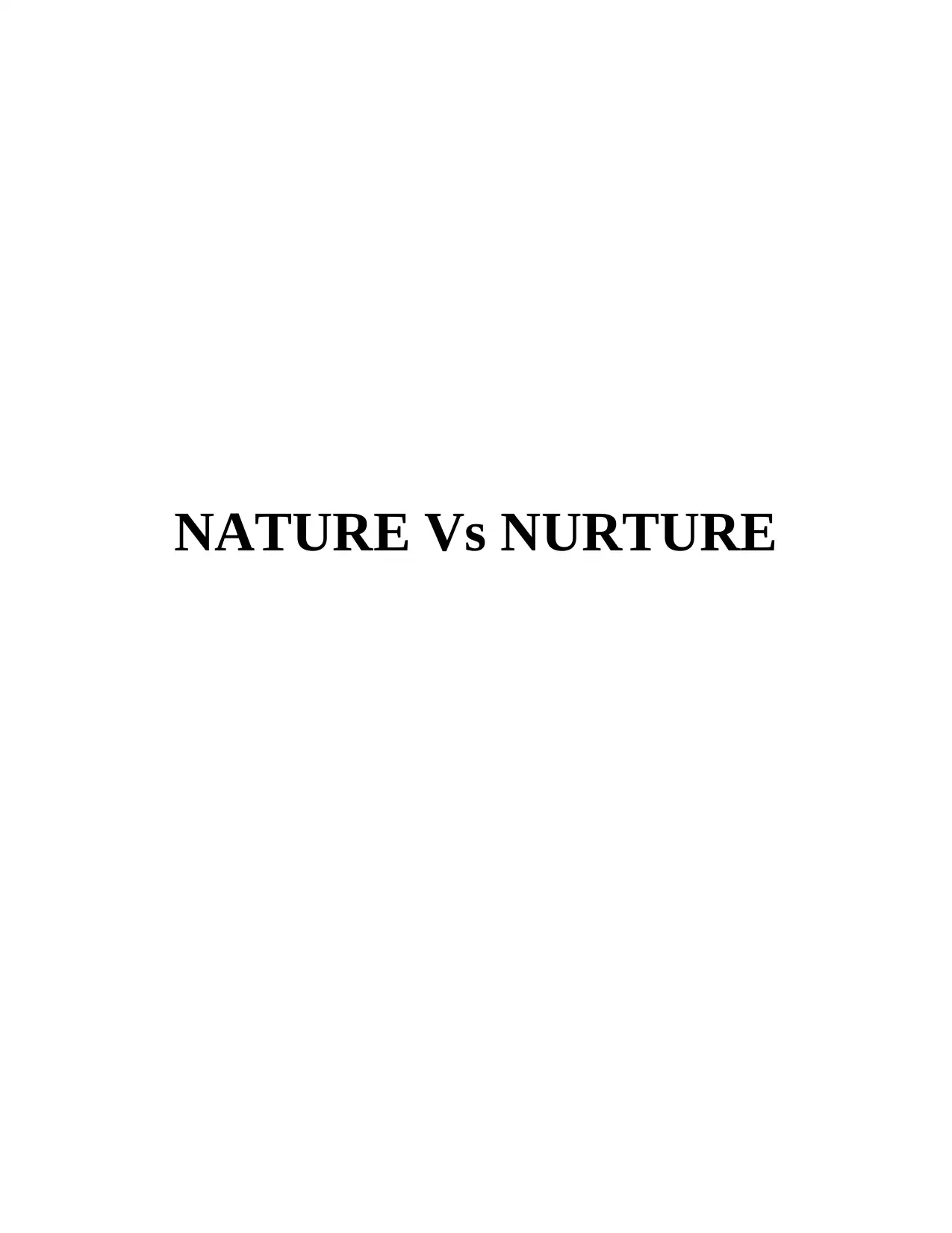
NATURE Vs NURTURE
Paraphrase This Document
Need a fresh take? Get an instant paraphrase of this document with our AI Paraphraser
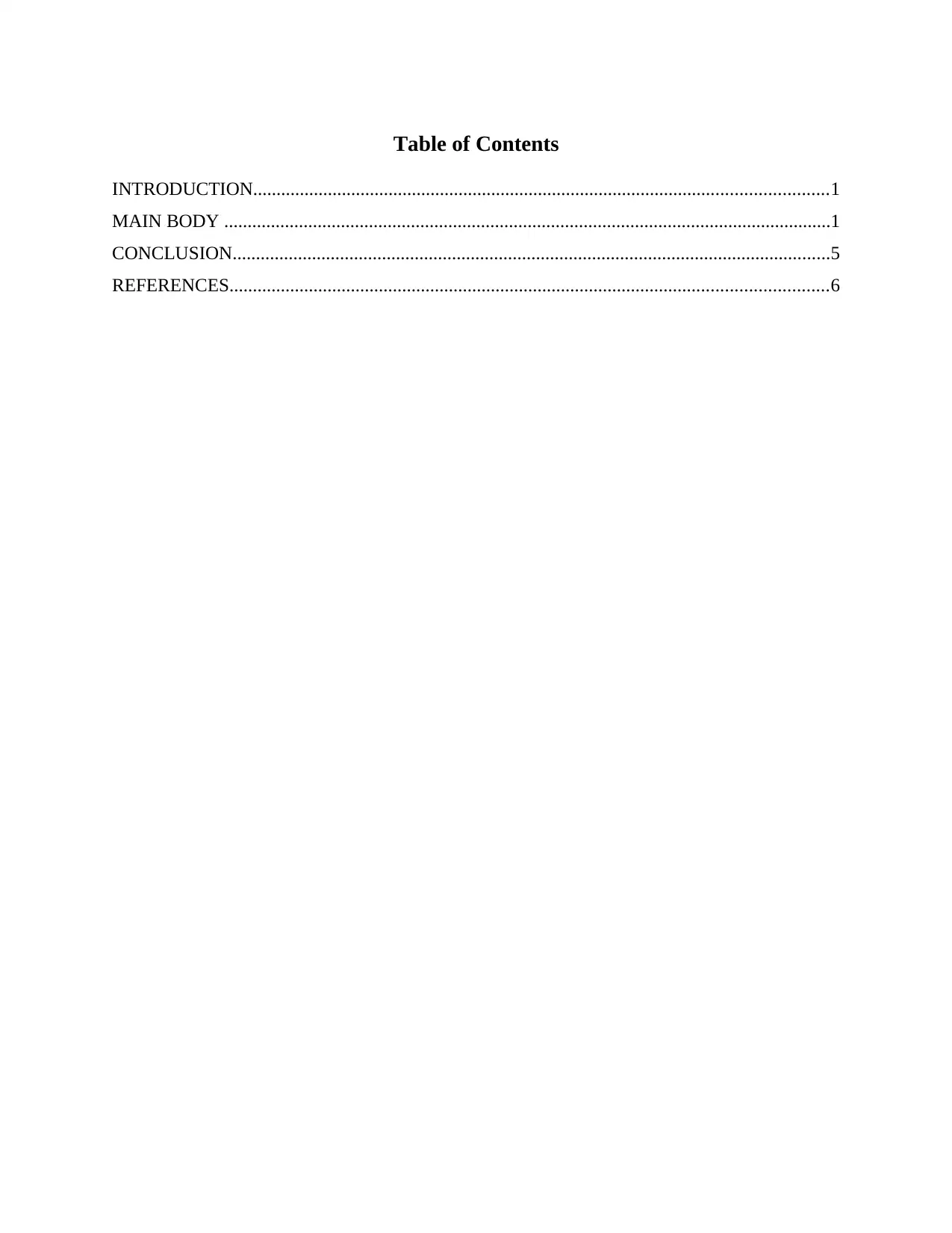
Table of Contents
INTRODUCTION...........................................................................................................................1
MAIN BODY ..................................................................................................................................1
CONCLUSION................................................................................................................................5
REFERENCES................................................................................................................................6
INTRODUCTION...........................................................................................................................1
MAIN BODY ..................................................................................................................................1
CONCLUSION................................................................................................................................5
REFERENCES................................................................................................................................6
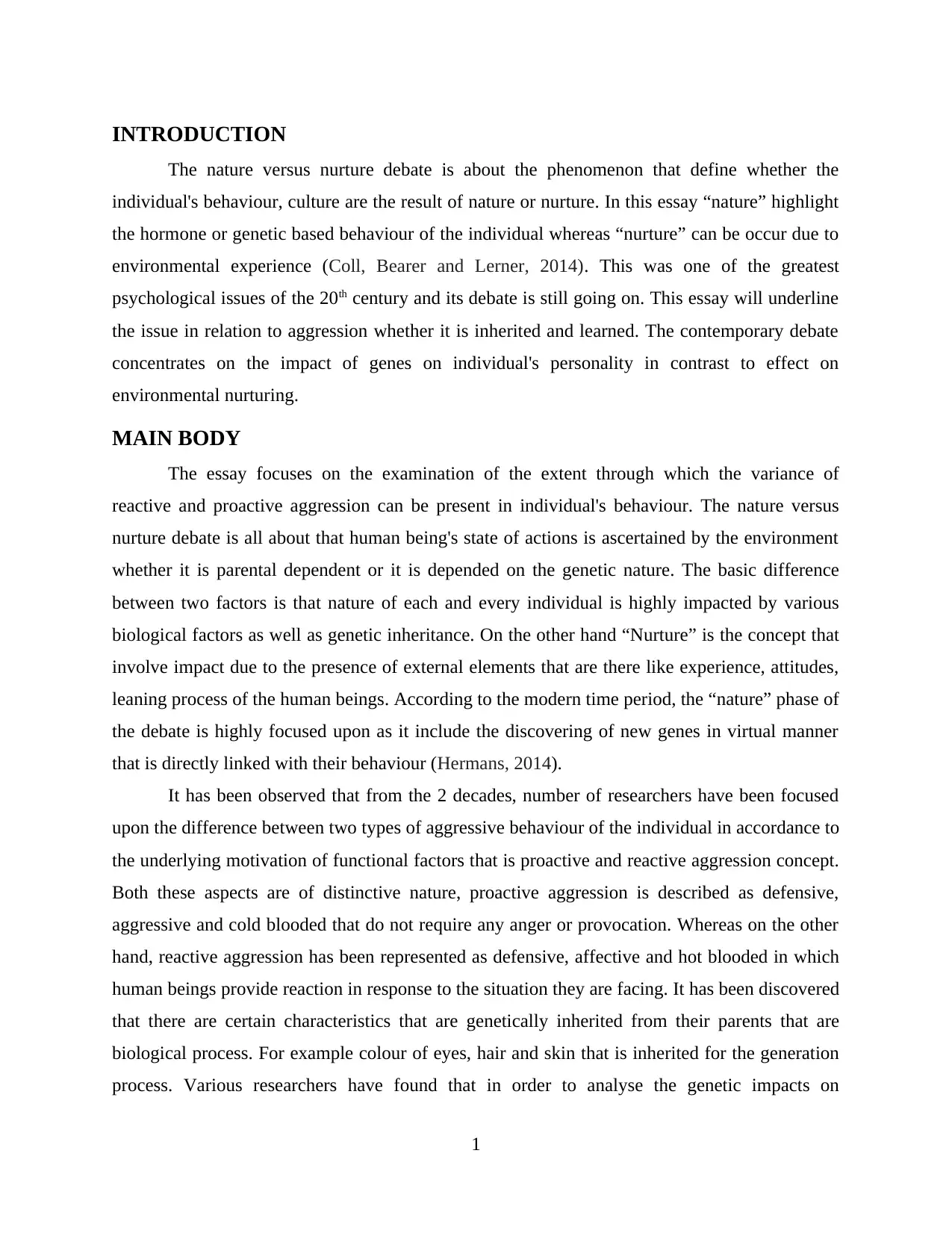
INTRODUCTION
The nature versus nurture debate is about the phenomenon that define whether the
individual's behaviour, culture are the result of nature or nurture. In this essay “nature” highlight
the hormone or genetic based behaviour of the individual whereas “nurture” can be occur due to
environmental experience (Coll, Bearer and Lerner, 2014). This was one of the greatest
psychological issues of the 20th century and its debate is still going on. This essay will underline
the issue in relation to aggression whether it is inherited and learned. The contemporary debate
concentrates on the impact of genes on individual's personality in contrast to effect on
environmental nurturing.
MAIN BODY
The essay focuses on the examination of the extent through which the variance of
reactive and proactive aggression can be present in individual's behaviour. The nature versus
nurture debate is all about that human being's state of actions is ascertained by the environment
whether it is parental dependent or it is depended on the genetic nature. The basic difference
between two factors is that nature of each and every individual is highly impacted by various
biological factors as well as genetic inheritance. On the other hand “Nurture” is the concept that
involve impact due to the presence of external elements that are there like experience, attitudes,
leaning process of the human beings. According to the modern time period, the “nature” phase of
the debate is highly focused upon as it include the discovering of new genes in virtual manner
that is directly linked with their behaviour (Hermans, 2014).
It has been observed that from the 2 decades, number of researchers have been focused
upon the difference between two types of aggressive behaviour of the individual in accordance to
the underlying motivation of functional factors that is proactive and reactive aggression concept.
Both these aspects are of distinctive nature, proactive aggression is described as defensive,
aggressive and cold blooded that do not require any anger or provocation. Whereas on the other
hand, reactive aggression has been represented as defensive, affective and hot blooded in which
human beings provide reaction in response to the situation they are facing. It has been discovered
that there are certain characteristics that are genetically inherited from their parents that are
biological process. For example colour of eyes, hair and skin that is inherited for the generation
process. Various researchers have found that in order to analyse the genetic impacts on
1
The nature versus nurture debate is about the phenomenon that define whether the
individual's behaviour, culture are the result of nature or nurture. In this essay “nature” highlight
the hormone or genetic based behaviour of the individual whereas “nurture” can be occur due to
environmental experience (Coll, Bearer and Lerner, 2014). This was one of the greatest
psychological issues of the 20th century and its debate is still going on. This essay will underline
the issue in relation to aggression whether it is inherited and learned. The contemporary debate
concentrates on the impact of genes on individual's personality in contrast to effect on
environmental nurturing.
MAIN BODY
The essay focuses on the examination of the extent through which the variance of
reactive and proactive aggression can be present in individual's behaviour. The nature versus
nurture debate is all about that human being's state of actions is ascertained by the environment
whether it is parental dependent or it is depended on the genetic nature. The basic difference
between two factors is that nature of each and every individual is highly impacted by various
biological factors as well as genetic inheritance. On the other hand “Nurture” is the concept that
involve impact due to the presence of external elements that are there like experience, attitudes,
leaning process of the human beings. According to the modern time period, the “nature” phase of
the debate is highly focused upon as it include the discovering of new genes in virtual manner
that is directly linked with their behaviour (Hermans, 2014).
It has been observed that from the 2 decades, number of researchers have been focused
upon the difference between two types of aggressive behaviour of the individual in accordance to
the underlying motivation of functional factors that is proactive and reactive aggression concept.
Both these aspects are of distinctive nature, proactive aggression is described as defensive,
aggressive and cold blooded that do not require any anger or provocation. Whereas on the other
hand, reactive aggression has been represented as defensive, affective and hot blooded in which
human beings provide reaction in response to the situation they are facing. It has been discovered
that there are certain characteristics that are genetically inherited from their parents that are
biological process. For example colour of eyes, hair and skin that is inherited for the generation
process. Various researchers have found that in order to analyse the genetic impacts on
1
⊘ This is a preview!⊘
Do you want full access?
Subscribe today to unlock all pages.

Trusted by 1+ million students worldwide
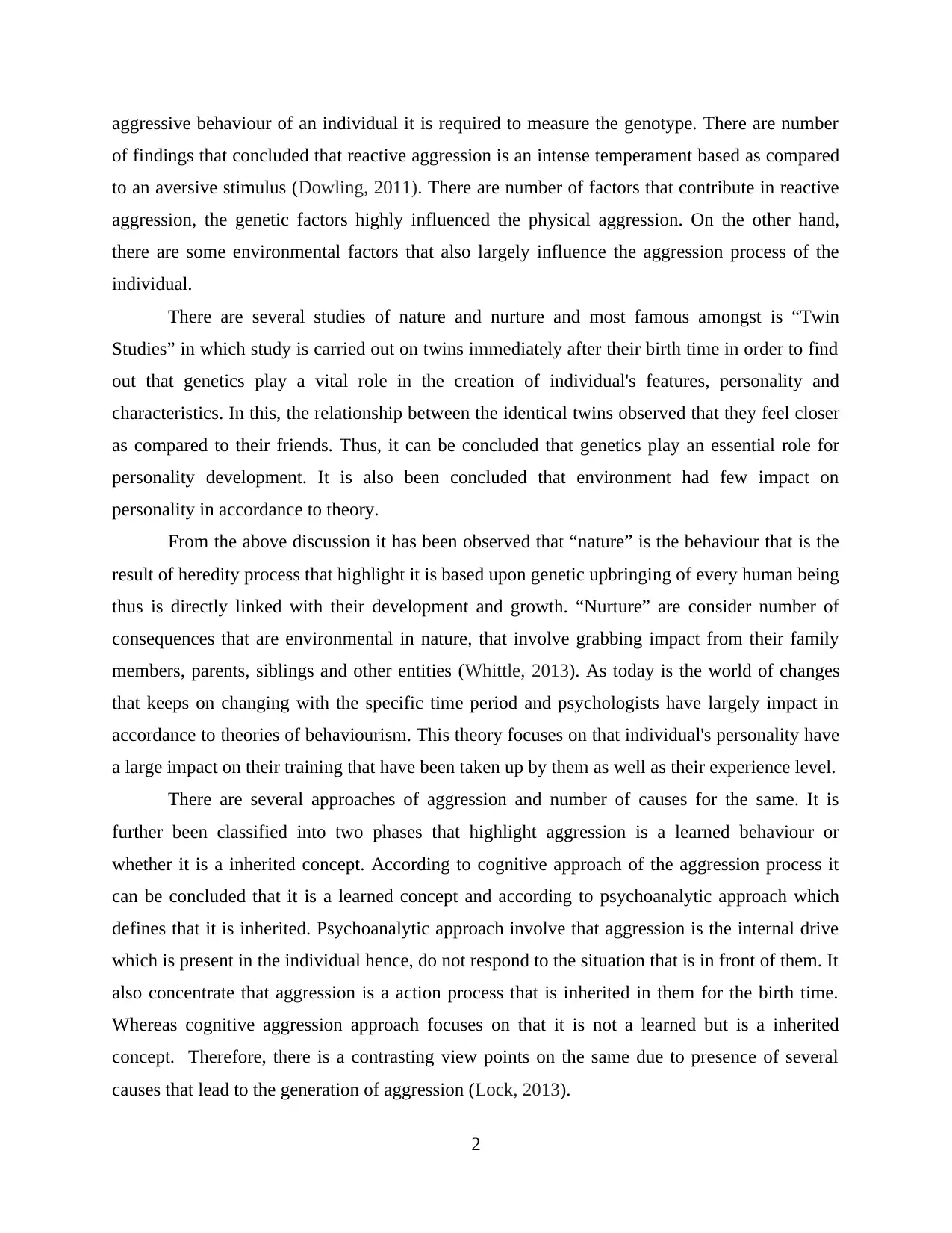
aggressive behaviour of an individual it is required to measure the genotype. There are number
of findings that concluded that reactive aggression is an intense temperament based as compared
to an aversive stimulus (Dowling, 2011). There are number of factors that contribute in reactive
aggression, the genetic factors highly influenced the physical aggression. On the other hand,
there are some environmental factors that also largely influence the aggression process of the
individual.
There are several studies of nature and nurture and most famous amongst is “Twin
Studies” in which study is carried out on twins immediately after their birth time in order to find
out that genetics play a vital role in the creation of individual's features, personality and
characteristics. In this, the relationship between the identical twins observed that they feel closer
as compared to their friends. Thus, it can be concluded that genetics play an essential role for
personality development. It is also been concluded that environment had few impact on
personality in accordance to theory.
From the above discussion it has been observed that “nature” is the behaviour that is the
result of heredity process that highlight it is based upon genetic upbringing of every human being
thus is directly linked with their development and growth. “Nurture” are consider number of
consequences that are environmental in nature, that involve grabbing impact from their family
members, parents, siblings and other entities (Whittle, 2013). As today is the world of changes
that keeps on changing with the specific time period and psychologists have largely impact in
accordance to theories of behaviourism. This theory focuses on that individual's personality have
a large impact on their training that have been taken up by them as well as their experience level.
There are several approaches of aggression and number of causes for the same. It is
further been classified into two phases that highlight aggression is a learned behaviour or
whether it is a inherited concept. According to cognitive approach of the aggression process it
can be concluded that it is a learned concept and according to psychoanalytic approach which
defines that it is inherited. Psychoanalytic approach involve that aggression is the internal drive
which is present in the individual hence, do not respond to the situation that is in front of them. It
also concentrate that aggression is a action process that is inherited in them for the birth time.
Whereas cognitive aggression approach focuses on that it is not a learned but is a inherited
concept. Therefore, there is a contrasting view points on the same due to presence of several
causes that lead to the generation of aggression (Lock, 2013).
2
of findings that concluded that reactive aggression is an intense temperament based as compared
to an aversive stimulus (Dowling, 2011). There are number of factors that contribute in reactive
aggression, the genetic factors highly influenced the physical aggression. On the other hand,
there are some environmental factors that also largely influence the aggression process of the
individual.
There are several studies of nature and nurture and most famous amongst is “Twin
Studies” in which study is carried out on twins immediately after their birth time in order to find
out that genetics play a vital role in the creation of individual's features, personality and
characteristics. In this, the relationship between the identical twins observed that they feel closer
as compared to their friends. Thus, it can be concluded that genetics play an essential role for
personality development. It is also been concluded that environment had few impact on
personality in accordance to theory.
From the above discussion it has been observed that “nature” is the behaviour that is the
result of heredity process that highlight it is based upon genetic upbringing of every human being
thus is directly linked with their development and growth. “Nurture” are consider number of
consequences that are environmental in nature, that involve grabbing impact from their family
members, parents, siblings and other entities (Whittle, 2013). As today is the world of changes
that keeps on changing with the specific time period and psychologists have largely impact in
accordance to theories of behaviourism. This theory focuses on that individual's personality have
a large impact on their training that have been taken up by them as well as their experience level.
There are several approaches of aggression and number of causes for the same. It is
further been classified into two phases that highlight aggression is a learned behaviour or
whether it is a inherited concept. According to cognitive approach of the aggression process it
can be concluded that it is a learned concept and according to psychoanalytic approach which
defines that it is inherited. Psychoanalytic approach involve that aggression is the internal drive
which is present in the individual hence, do not respond to the situation that is in front of them. It
also concentrate that aggression is a action process that is inherited in them for the birth time.
Whereas cognitive aggression approach focuses on that it is not a learned but is a inherited
concept. Therefore, there is a contrasting view points on the same due to presence of several
causes that lead to the generation of aggression (Lock, 2013).
2
Paraphrase This Document
Need a fresh take? Get an instant paraphrase of this document with our AI Paraphraser
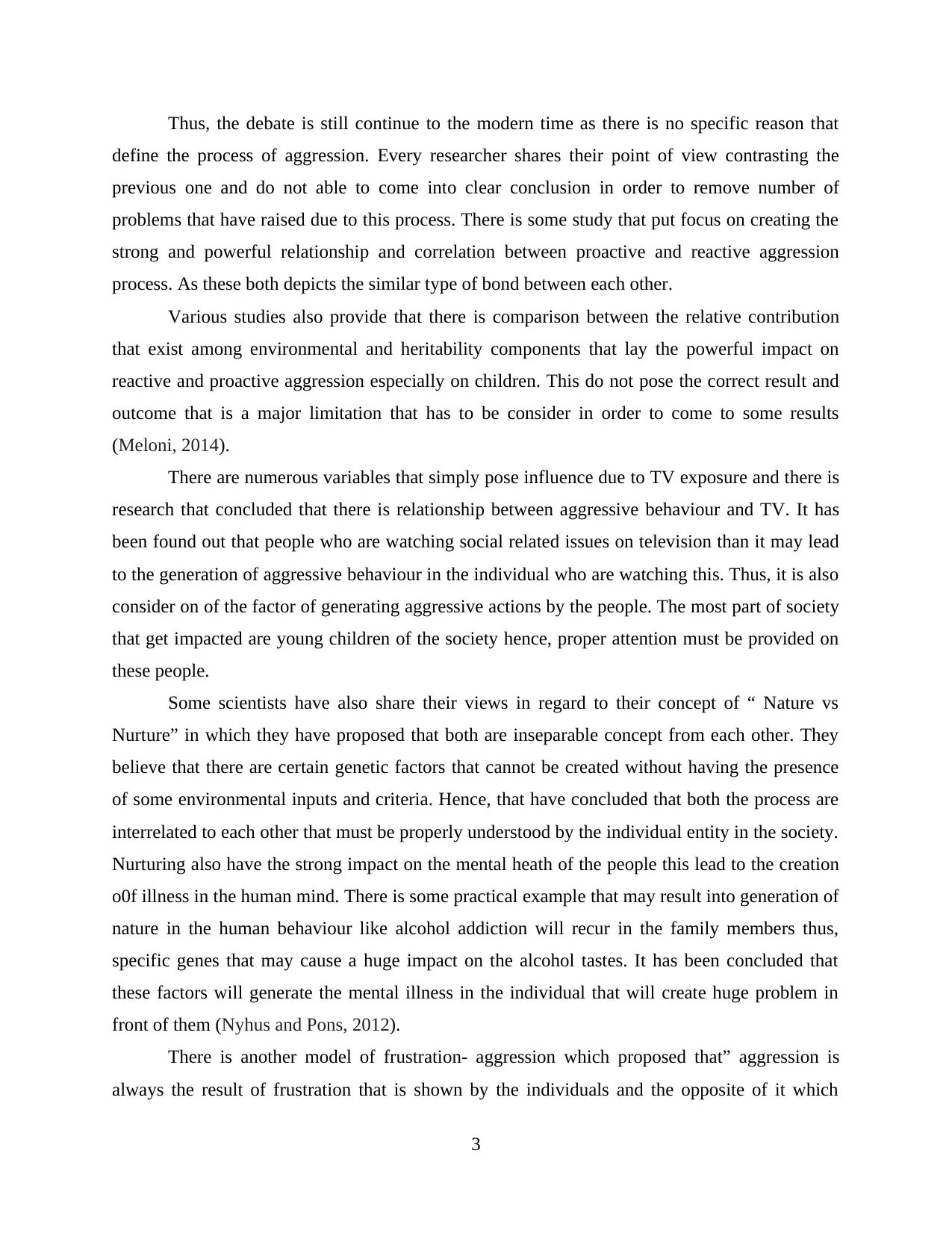
Thus, the debate is still continue to the modern time as there is no specific reason that
define the process of aggression. Every researcher shares their point of view contrasting the
previous one and do not able to come into clear conclusion in order to remove number of
problems that have raised due to this process. There is some study that put focus on creating the
strong and powerful relationship and correlation between proactive and reactive aggression
process. As these both depicts the similar type of bond between each other.
Various studies also provide that there is comparison between the relative contribution
that exist among environmental and heritability components that lay the powerful impact on
reactive and proactive aggression especially on children. This do not pose the correct result and
outcome that is a major limitation that has to be consider in order to come to some results
(Meloni, 2014).
There are numerous variables that simply pose influence due to TV exposure and there is
research that concluded that there is relationship between aggressive behaviour and TV. It has
been found out that people who are watching social related issues on television than it may lead
to the generation of aggressive behaviour in the individual who are watching this. Thus, it is also
consider on of the factor of generating aggressive actions by the people. The most part of society
that get impacted are young children of the society hence, proper attention must be provided on
these people.
Some scientists have also share their views in regard to their concept of “ Nature vs
Nurture” in which they have proposed that both are inseparable concept from each other. They
believe that there are certain genetic factors that cannot be created without having the presence
of some environmental inputs and criteria. Hence, that have concluded that both the process are
interrelated to each other that must be properly understood by the individual entity in the society.
Nurturing also have the strong impact on the mental heath of the people this lead to the creation
o0f illness in the human mind. There is some practical example that may result into generation of
nature in the human behaviour like alcohol addiction will recur in the family members thus,
specific genes that may cause a huge impact on the alcohol tastes. It has been concluded that
these factors will generate the mental illness in the individual that will create huge problem in
front of them (Nyhus and Pons, 2012).
There is another model of frustration- aggression which proposed that” aggression is
always the result of frustration that is shown by the individuals and the opposite of it which
3
define the process of aggression. Every researcher shares their point of view contrasting the
previous one and do not able to come into clear conclusion in order to remove number of
problems that have raised due to this process. There is some study that put focus on creating the
strong and powerful relationship and correlation between proactive and reactive aggression
process. As these both depicts the similar type of bond between each other.
Various studies also provide that there is comparison between the relative contribution
that exist among environmental and heritability components that lay the powerful impact on
reactive and proactive aggression especially on children. This do not pose the correct result and
outcome that is a major limitation that has to be consider in order to come to some results
(Meloni, 2014).
There are numerous variables that simply pose influence due to TV exposure and there is
research that concluded that there is relationship between aggressive behaviour and TV. It has
been found out that people who are watching social related issues on television than it may lead
to the generation of aggressive behaviour in the individual who are watching this. Thus, it is also
consider on of the factor of generating aggressive actions by the people. The most part of society
that get impacted are young children of the society hence, proper attention must be provided on
these people.
Some scientists have also share their views in regard to their concept of “ Nature vs
Nurture” in which they have proposed that both are inseparable concept from each other. They
believe that there are certain genetic factors that cannot be created without having the presence
of some environmental inputs and criteria. Hence, that have concluded that both the process are
interrelated to each other that must be properly understood by the individual entity in the society.
Nurturing also have the strong impact on the mental heath of the people this lead to the creation
o0f illness in the human mind. There is some practical example that may result into generation of
nature in the human behaviour like alcohol addiction will recur in the family members thus,
specific genes that may cause a huge impact on the alcohol tastes. It has been concluded that
these factors will generate the mental illness in the individual that will create huge problem in
front of them (Nyhus and Pons, 2012).
There is another model of frustration- aggression which proposed that” aggression is
always the result of frustration that is shown by the individuals and the opposite of it which
3
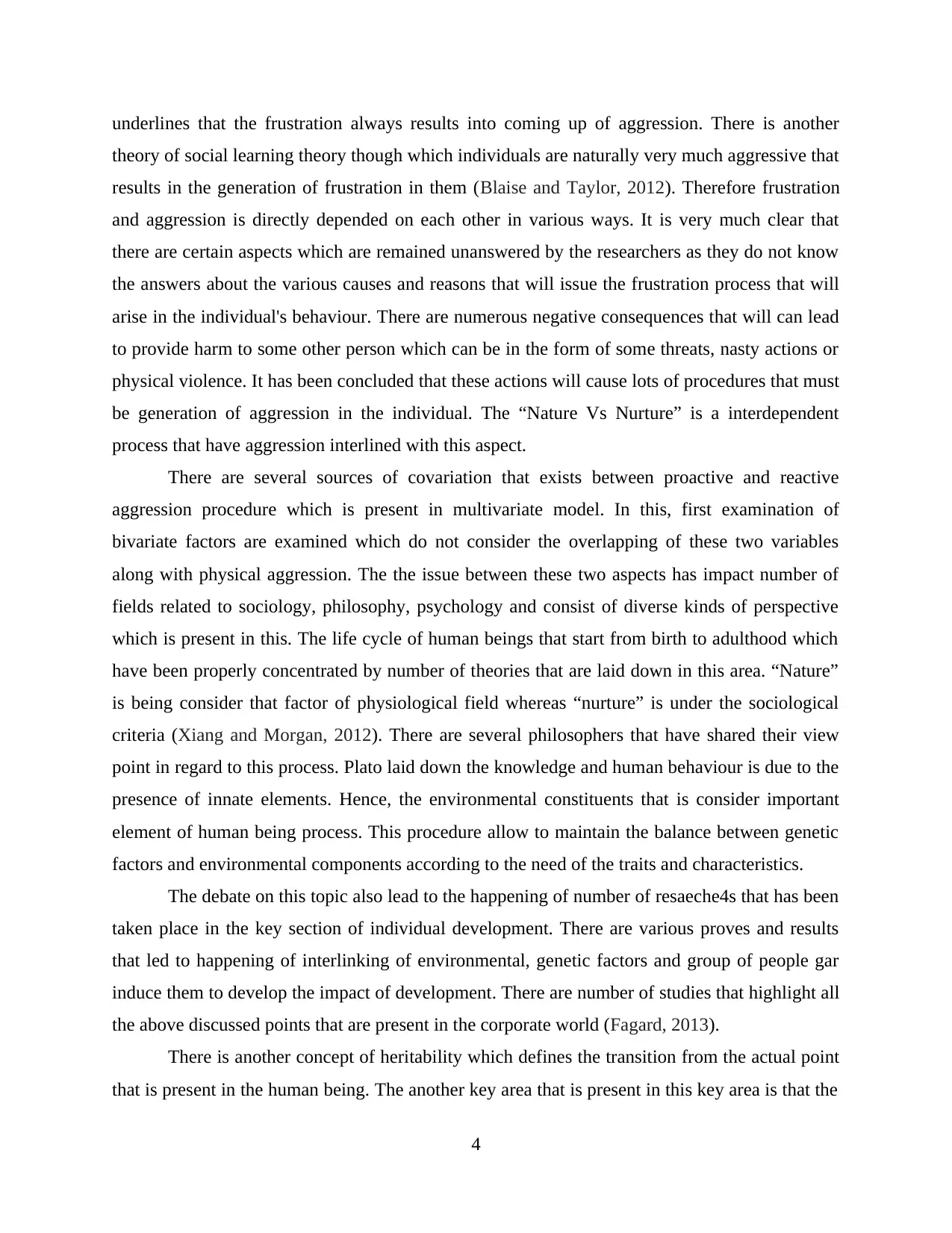
underlines that the frustration always results into coming up of aggression. There is another
theory of social learning theory though which individuals are naturally very much aggressive that
results in the generation of frustration in them (Blaise and Taylor, 2012). Therefore frustration
and aggression is directly depended on each other in various ways. It is very much clear that
there are certain aspects which are remained unanswered by the researchers as they do not know
the answers about the various causes and reasons that will issue the frustration process that will
arise in the individual's behaviour. There are numerous negative consequences that will can lead
to provide harm to some other person which can be in the form of some threats, nasty actions or
physical violence. It has been concluded that these actions will cause lots of procedures that must
be generation of aggression in the individual. The “Nature Vs Nurture” is a interdependent
process that have aggression interlined with this aspect.
There are several sources of covariation that exists between proactive and reactive
aggression procedure which is present in multivariate model. In this, first examination of
bivariate factors are examined which do not consider the overlapping of these two variables
along with physical aggression. The the issue between these two aspects has impact number of
fields related to sociology, philosophy, psychology and consist of diverse kinds of perspective
which is present in this. The life cycle of human beings that start from birth to adulthood which
have been properly concentrated by number of theories that are laid down in this area. “Nature”
is being consider that factor of physiological field whereas “nurture” is under the sociological
criteria (Xiang and Morgan, 2012). There are several philosophers that have shared their view
point in regard to this process. Plato laid down the knowledge and human behaviour is due to the
presence of innate elements. Hence, the environmental constituents that is consider important
element of human being process. This procedure allow to maintain the balance between genetic
factors and environmental components according to the need of the traits and characteristics.
The debate on this topic also lead to the happening of number of resaeche4s that has been
taken place in the key section of individual development. There are various proves and results
that led to happening of interlinking of environmental, genetic factors and group of people gar
induce them to develop the impact of development. There are number of studies that highlight all
the above discussed points that are present in the corporate world (Fagard, 2013).
There is another concept of heritability which defines the transition from the actual point
that is present in the human being. The another key area that is present in this key area is that the
4
theory of social learning theory though which individuals are naturally very much aggressive that
results in the generation of frustration in them (Blaise and Taylor, 2012). Therefore frustration
and aggression is directly depended on each other in various ways. It is very much clear that
there are certain aspects which are remained unanswered by the researchers as they do not know
the answers about the various causes and reasons that will issue the frustration process that will
arise in the individual's behaviour. There are numerous negative consequences that will can lead
to provide harm to some other person which can be in the form of some threats, nasty actions or
physical violence. It has been concluded that these actions will cause lots of procedures that must
be generation of aggression in the individual. The “Nature Vs Nurture” is a interdependent
process that have aggression interlined with this aspect.
There are several sources of covariation that exists between proactive and reactive
aggression procedure which is present in multivariate model. In this, first examination of
bivariate factors are examined which do not consider the overlapping of these two variables
along with physical aggression. The the issue between these two aspects has impact number of
fields related to sociology, philosophy, psychology and consist of diverse kinds of perspective
which is present in this. The life cycle of human beings that start from birth to adulthood which
have been properly concentrated by number of theories that are laid down in this area. “Nature”
is being consider that factor of physiological field whereas “nurture” is under the sociological
criteria (Xiang and Morgan, 2012). There are several philosophers that have shared their view
point in regard to this process. Plato laid down the knowledge and human behaviour is due to the
presence of innate elements. Hence, the environmental constituents that is consider important
element of human being process. This procedure allow to maintain the balance between genetic
factors and environmental components according to the need of the traits and characteristics.
The debate on this topic also lead to the happening of number of resaeche4s that has been
taken place in the key section of individual development. There are various proves and results
that led to happening of interlinking of environmental, genetic factors and group of people gar
induce them to develop the impact of development. There are number of studies that highlight all
the above discussed points that are present in the corporate world (Fagard, 2013).
There is another concept of heritability which defines the transition from the actual point
that is present in the human being. The another key area that is present in this key area is that the
4
⊘ This is a preview!⊘
Do you want full access?
Subscribe today to unlock all pages.

Trusted by 1+ million students worldwide
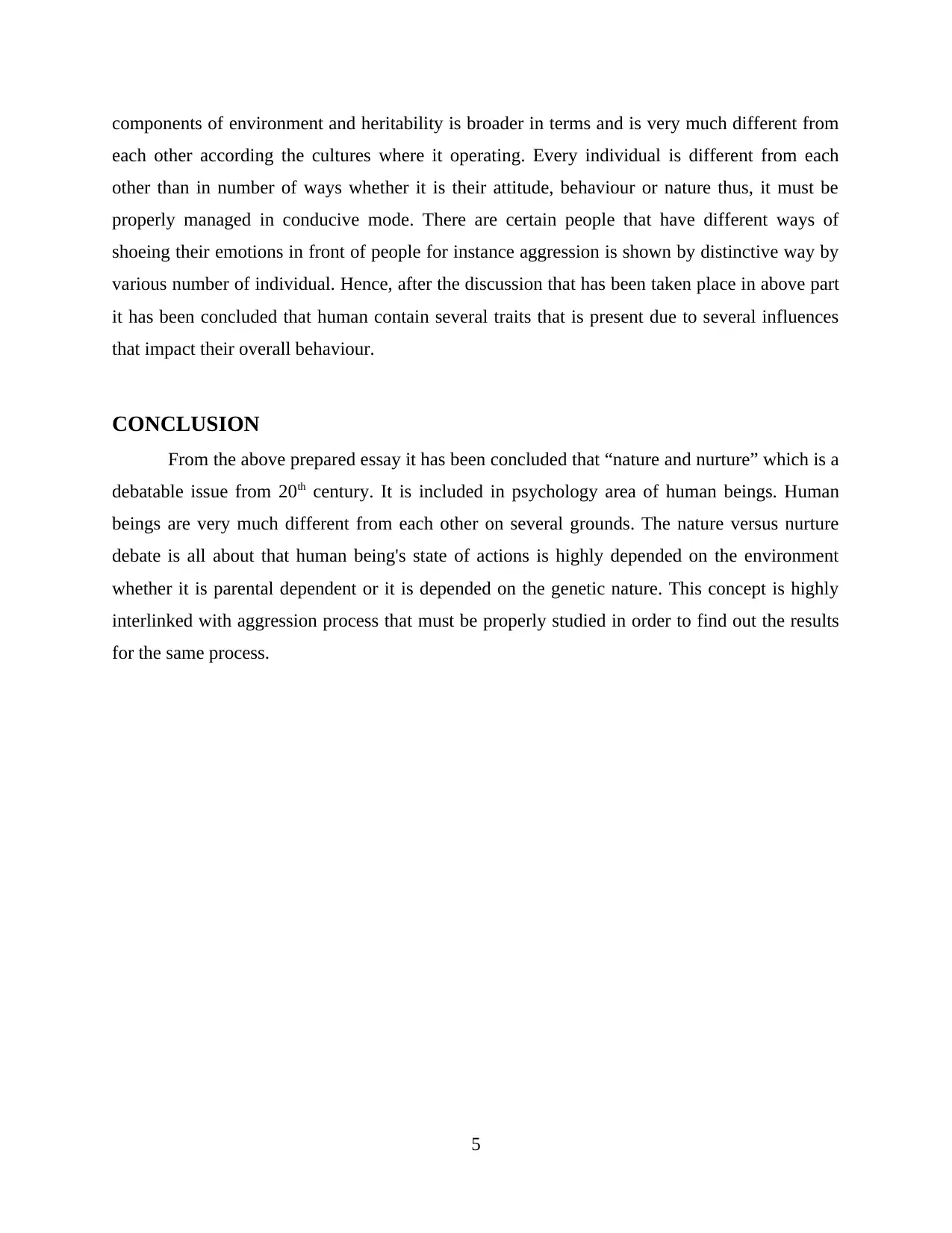
components of environment and heritability is broader in terms and is very much different from
each other according the cultures where it operating. Every individual is different from each
other than in number of ways whether it is their attitude, behaviour or nature thus, it must be
properly managed in conducive mode. There are certain people that have different ways of
shoeing their emotions in front of people for instance aggression is shown by distinctive way by
various number of individual. Hence, after the discussion that has been taken place in above part
it has been concluded that human contain several traits that is present due to several influences
that impact their overall behaviour.
CONCLUSION
From the above prepared essay it has been concluded that “nature and nurture” which is a
debatable issue from 20th century. It is included in psychology area of human beings. Human
beings are very much different from each other on several grounds. The nature versus nurture
debate is all about that human being's state of actions is highly depended on the environment
whether it is parental dependent or it is depended on the genetic nature. This concept is highly
interlinked with aggression process that must be properly studied in order to find out the results
for the same process.
5
each other according the cultures where it operating. Every individual is different from each
other than in number of ways whether it is their attitude, behaviour or nature thus, it must be
properly managed in conducive mode. There are certain people that have different ways of
shoeing their emotions in front of people for instance aggression is shown by distinctive way by
various number of individual. Hence, after the discussion that has been taken place in above part
it has been concluded that human contain several traits that is present due to several influences
that impact their overall behaviour.
CONCLUSION
From the above prepared essay it has been concluded that “nature and nurture” which is a
debatable issue from 20th century. It is included in psychology area of human beings. Human
beings are very much different from each other on several grounds. The nature versus nurture
debate is all about that human being's state of actions is highly depended on the environment
whether it is parental dependent or it is depended on the genetic nature. This concept is highly
interlinked with aggression process that must be properly studied in order to find out the results
for the same process.
5
Paraphrase This Document
Need a fresh take? Get an instant paraphrase of this document with our AI Paraphraser
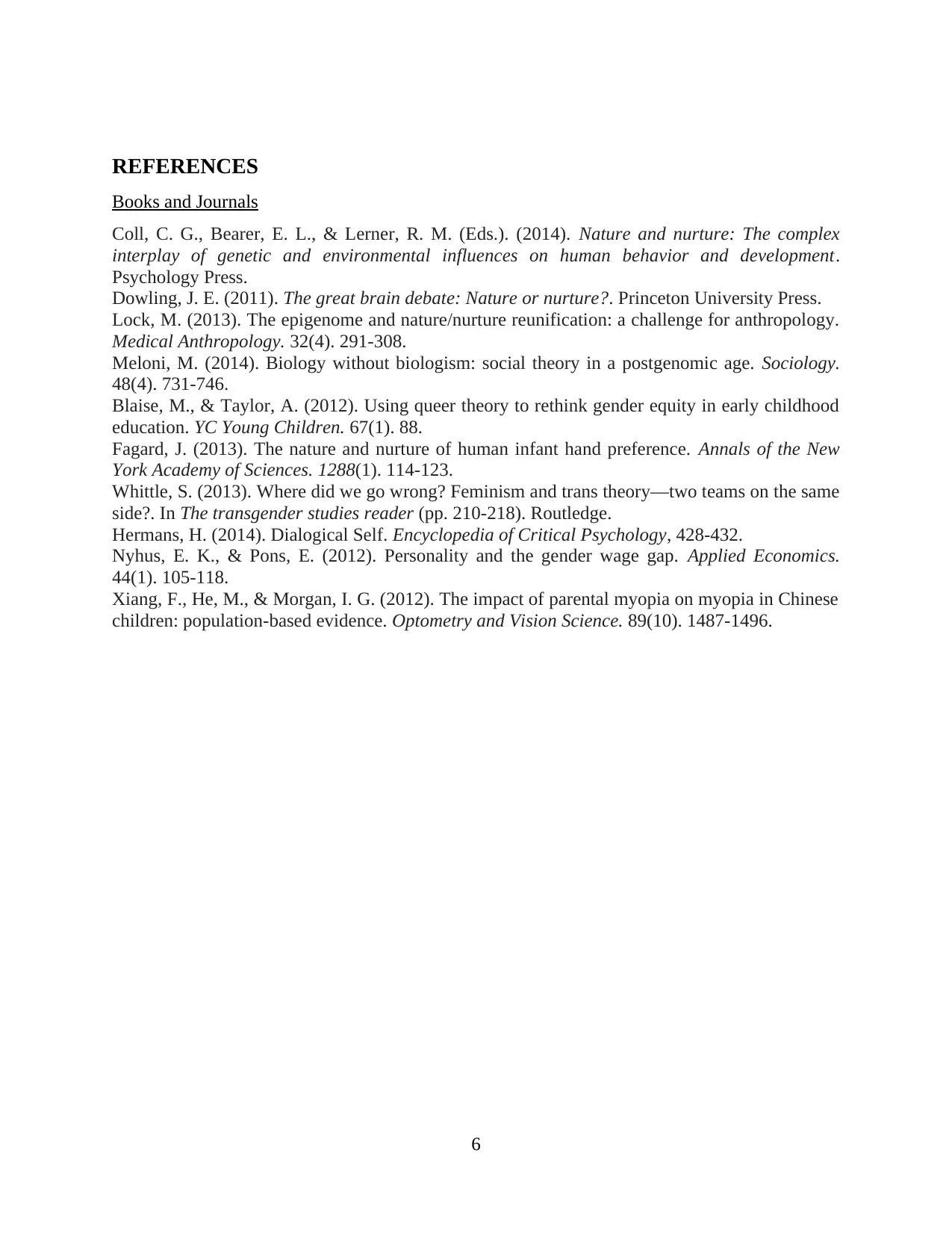
REFERENCES
Books and Journals
Coll, C. G., Bearer, E. L., & Lerner, R. M. (Eds.). (2014). Nature and nurture: The complex
interplay of genetic and environmental influences on human behavior and development.
Psychology Press.
Dowling, J. E. (2011). The great brain debate: Nature or nurture?. Princeton University Press.
Lock, M. (2013). The epigenome and nature/nurture reunification: a challenge for anthropology.
Medical Anthropology. 32(4). 291-308.
Meloni, M. (2014). Biology without biologism: social theory in a postgenomic age. Sociology.
48(4). 731-746.
Blaise, M., & Taylor, A. (2012). Using queer theory to rethink gender equity in early childhood
education. YC Young Children. 67(1). 88.
Fagard, J. (2013). The nature and nurture of human infant hand preference. Annals of the New
York Academy of Sciences. 1288(1). 114-123.
Whittle, S. (2013). Where did we go wrong? Feminism and trans theory—two teams on the same
side?. In The transgender studies reader (pp. 210-218). Routledge.
Hermans, H. (2014). Dialogical Self. Encyclopedia of Critical Psychology, 428-432.
Nyhus, E. K., & Pons, E. (2012). Personality and the gender wage gap. Applied Economics.
44(1). 105-118.
Xiang, F., He, M., & Morgan, I. G. (2012). The impact of parental myopia on myopia in Chinese
children: population-based evidence. Optometry and Vision Science. 89(10). 1487-1496.
6
Books and Journals
Coll, C. G., Bearer, E. L., & Lerner, R. M. (Eds.). (2014). Nature and nurture: The complex
interplay of genetic and environmental influences on human behavior and development.
Psychology Press.
Dowling, J. E. (2011). The great brain debate: Nature or nurture?. Princeton University Press.
Lock, M. (2013). The epigenome and nature/nurture reunification: a challenge for anthropology.
Medical Anthropology. 32(4). 291-308.
Meloni, M. (2014). Biology without biologism: social theory in a postgenomic age. Sociology.
48(4). 731-746.
Blaise, M., & Taylor, A. (2012). Using queer theory to rethink gender equity in early childhood
education. YC Young Children. 67(1). 88.
Fagard, J. (2013). The nature and nurture of human infant hand preference. Annals of the New
York Academy of Sciences. 1288(1). 114-123.
Whittle, S. (2013). Where did we go wrong? Feminism and trans theory—two teams on the same
side?. In The transgender studies reader (pp. 210-218). Routledge.
Hermans, H. (2014). Dialogical Self. Encyclopedia of Critical Psychology, 428-432.
Nyhus, E. K., & Pons, E. (2012). Personality and the gender wage gap. Applied Economics.
44(1). 105-118.
Xiang, F., He, M., & Morgan, I. G. (2012). The impact of parental myopia on myopia in Chinese
children: population-based evidence. Optometry and Vision Science. 89(10). 1487-1496.
6

7
⊘ This is a preview!⊘
Do you want full access?
Subscribe today to unlock all pages.

Trusted by 1+ million students worldwide
1 out of 9
Related Documents
Your All-in-One AI-Powered Toolkit for Academic Success.
+13062052269
info@desklib.com
Available 24*7 on WhatsApp / Email
![[object Object]](/_next/static/media/star-bottom.7253800d.svg)
Unlock your academic potential
Copyright © 2020–2026 A2Z Services. All Rights Reserved. Developed and managed by ZUCOL.




